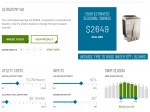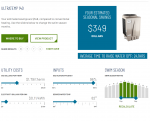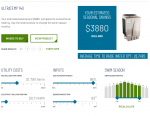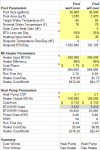We are getting quotes for an inground pool and we are certain that we would like a heater but are trying to decide between a propane heater and a heat pump. So I ran the calculator on Pentair's website using my zipcode and utility costs for a 20x40 36,000gal pool heated to 82F May through September. The yearly cost savings that is calculated is ~$2600 I am questioning how realistic this number is? If this number is anywhere close to accurate then it would seem to make sense to me to go with the heatpump as the savings would offset the additional ~$3000 upfront cost of the heatpump after just 1-2 years. I would love to hear opinions on what heater would be best for us and the accuracy of Pentair's calculator. I did verify that our current propane cost is $1.63/gal which I multiplied by 1.1gal/therm to get $1.79/therm and that our current price for electricity is $0.11/kwh. Here is a screenshot from the calculator:






